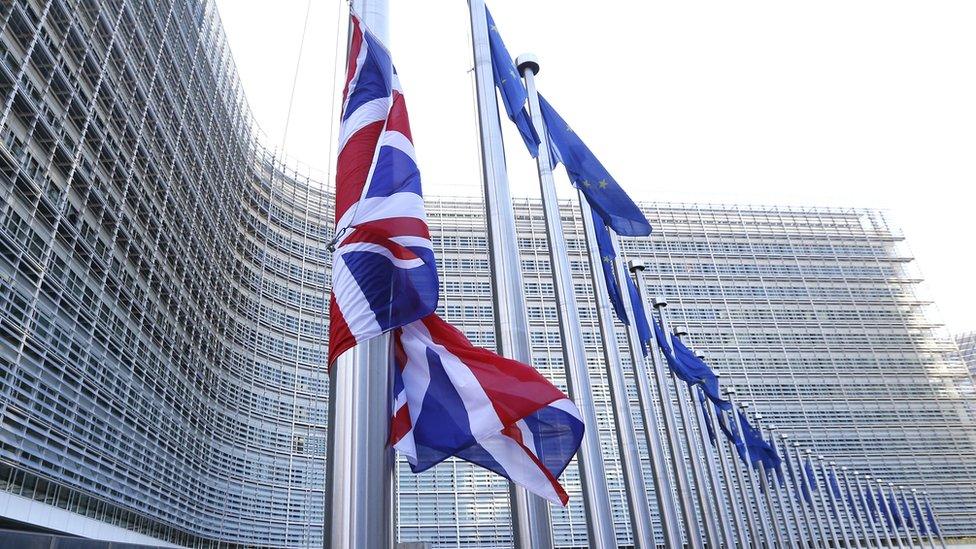City of London grapples with new EU shake-up
- Published

The City of London is braced for the chill winds of regulation
Financial institutions across the UK are gearing up for one of the most far-reaching regulatory shake-ups they have ever faced.
There's a five-letter acronym regularly muttered in the City of London, which leads to some rubbing of chins, looks of bewilderment and groans about the workload.
The acronym in question is Mifid 2, the name of a rather technical, complex and, yes, dull-sounding piece of financial legislation from the EU.
It stands for the Markets in Financial Instruments Directive. Mifid 2 means big changes for banks across Europe over the next year.
"It's a complete system change, very detailed," says Anthony Browne, who runs the British Bankers' Association (BBA).
"It is changing their IT systems, changing the way their whole systems operate right from the front end and the information the traders put in to the back end and information they provide to clients; it's also the documentation they provide for their clients, and information they give to regulators themselves."
'Unintended consequences'
The rules run to more than 1,000 pages.
The new rulebook - or perhaps rule "tome", more accurately - is the EU's response to the financial crisis.
A decade on from that scarring experience, the European Commission predicts the law will be transformative for markets.

Despite the Brexit vote, the City still has to abide by the new EU regulations
Many banks back the new rules, saying they will help avoid a rerun of 2007-08 by bringing in more transparency and giving investors greater protection.
Some companies, though, say they are too tough and have already led to job losses.
"It is the unintended consequences that could be the problem here," says Julian Allen-Ellis from the EFMA financial markets trade body.
"The operational cost of both buy-side and sell-side setting up for this new regulation could mean profitability is impacted and that ultimately impacts the person on the street with their pension and their portfolio."

So why Mifid 2?
It's the sequel to Mifid 1, which has been in force since November 2007
That made it easier and cheaper to buy investments across the EU, by allowing investment firms to operate across borders more easily
But the financial crash exposed some of its weaknesses
So the European Commission now wants to make financial markets "more efficient, resilient and transparent" and to "strengthen the protection of investors"
The new regulations come into force in 2018

A recent survey of the City by PA Consulting suggested two out of five companies were not prepared enough to implement the new rules.
They'd better get a move on. The sprawling regulations come into force in January 2018.
Way forward?
There are some who argue that these complex EU rules could be a big help to the City after Brexit, because they contain something called "equivalence".
That allows financial companies from outside the EU to do business inside it, as long as their home country has the same standards of regulation.

The City is wary of what Mifid 2 will usher in
"Potentially this could be a way through the mire," says David Biggin, an adviser at PA Consulting.
"For a lot of the companies talking about relocating, actually this rule might allow some light at the end of the tunnel. It's a technocratic decision rather than a political decision. It is a way forward."
However, not everyone thinks "equivalence" will save the City's bacon if it finds itself with less favourable access to the EU than it has today.
"The main drawback is it can be withdrawn unilaterally at any time," warns the BBA's Anthony Browne.
He has other concerns too. "This would be a political process done at a time when the UK is negotiating its divorce arrangements from the EU, and when it's thinking about negotiating a trade deal with the EU. The chance we would get agreement on equivalence, to come in the day the UK leaves the EU, seems hopeful at best."
Roadblock fears
The experience of some countries already outside the EU seem to bear that fear out.
Several have already applied for "equivalence" status under previous financial rules.
Guernsey is one of them. The Crown dependency has beefed up its laws, and they have been judged as technically the same as the EU's by an EU regulator, no less.
Guernsey is now waiting for the European Commission to give it the final nod - and has been for two years.
"The technical decision was made. Now it's become a political decision," says Christopher Jehan from the Guernsey Investment Fund Association.
"That political decision is effectively the roadblock for us," he says. "They're using whatever reason they have for anything else going on in the world as a delaying tactic."
Guernsey's experience does not bode well for those in the UK who think these new complex EU rules will help the City after Brexit.
But Mifid 2 is already bringing about big regulatory change in the City, the scale of which it has rarely seen.